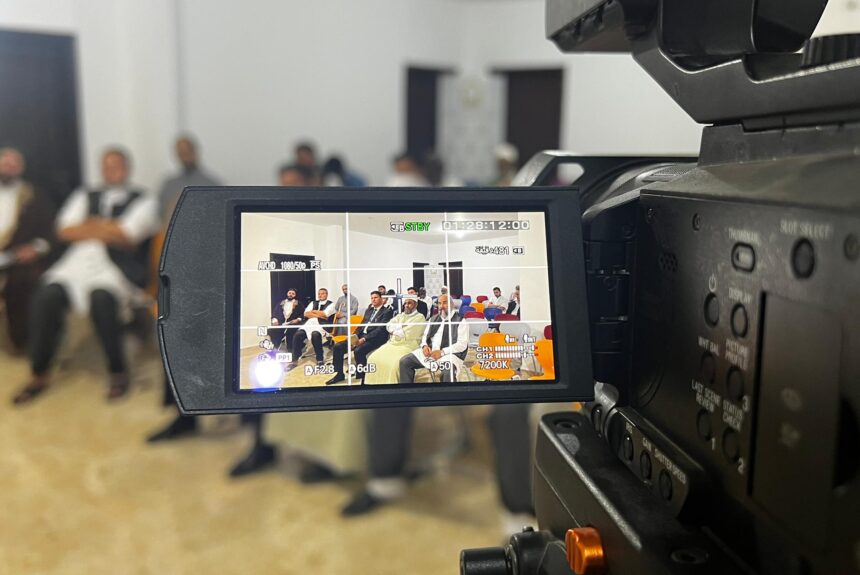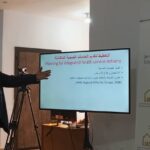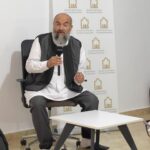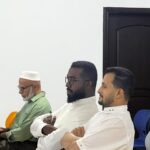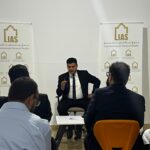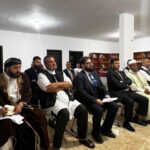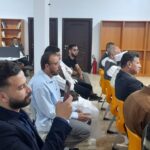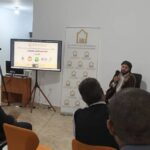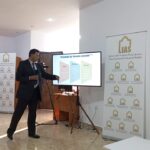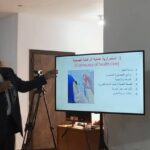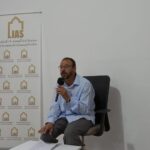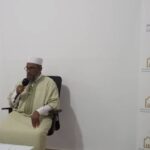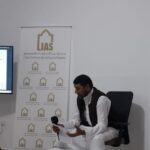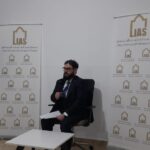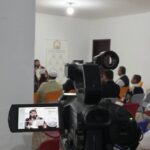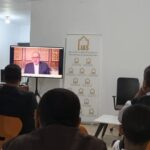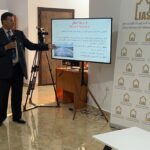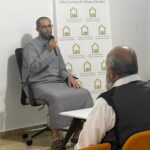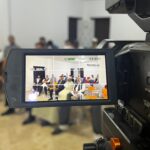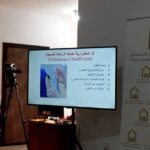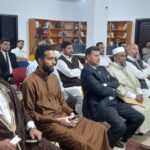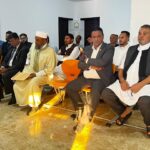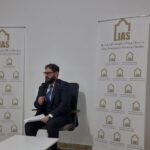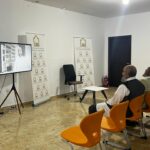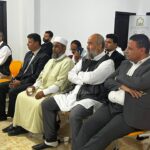Today, Wednesday, 12 Rabi’ al-Awwal 1445 AH, corresponding to September 27, 2023, the Libya Academy for Advanced Studies organized a symposium entitled: Prophetic Solutions to Problems and Disasters.
In cooperation with the Center for Islamic Research and Studies, the Insan Foundation for Charitable Works and Development, the Lighthouse of Statement and Collection, the Al-Multaqa Foundation, and the Creative Child Foundation.
Introduction: Celebrating the Messenger of God, may God’s prayers and peace be upon him, the teacher of people’s fear, support, and values, whom God sent as a mercy to the worlds, spreading the values of peace, brotherhood, compassion, solidarity, and cooperation, concerned with the affairs of his nation, men and women, youth and children, calling for them, taking by their hands what is good for their religion. And their world; On the anniversary of his birth, we remember the high values, the lofty meanings, and the great aspirations, and we remember them cognitively and scientifically, and we remind ourselves of them, especially in times of distress and crises, and times of fear that we saw and are seeing from all the people of the country for the sake of their brothers in the city of Derna, recalling all the prophetic commands commanding mercy, kindness, and fear. Altruism, love of goodness, and support, as there is no more in this time and country.
We also recall the strategic solutions that the Messenger of God, may God bless him and grant him peace, called for to reconstruct this universe, serve humanity, and be kind to man in the stages of his life, pointing out what should be done in disasters, crises, and problems, emphasizing strategic values far from commodification, taking his hands to please his Lord, Glory be to Him. And come.
The symposium was held in the hall of the Libya Academy for Advanced Studies in Benghazi, in the presence of interested people and specialists. It included three scientific sessions, in which sixteen researchers participated, including three female researchers, from the following cities: Benghazi, Derna, Al-Bayda, Al-Zawiya, Zliten, and Sabha. The meeting was moderated by A. Muhammad Al-Fitouri, a faculty member at the Center for Islamic Research and Studies, and Director of the Publishing Department at the Libya Academy.
Speaking in the first session: Professor Muhammad Abu-Jilah, professor of Islamic studies at Libyan universities, and his intervention was entitled: The approach of the Qur’an and Sunnah in preventing devastating calamities.
Mr. Hamad Ali Al-Shaeri, a professor and teacher in schools and secondary schools, and the author of the books, also spoke with an intervention entitled: Charitable work in Islam, texts and purposes.
And the intervention of Dr. Ramadan Sati, who holds a Libyan fellowship in medical microbiology, a master’s degree in science and environment, and several diplomas in laboratory medicine, infection, and quality, a specialist in laboratories, an environmental activist, and a lecturer in colleges and higher institutes, and his paper is entitled: Planning for evaluation and provision of services. Integrated health care in disasters and crises, with models, examples, and illustrative images.
Then Professor Osama Al-Turki, a faculty member at the Center for White Islamic Research and Studies, spoke with an intervention entitled: Love for the Prophet, may God’s prayers and peace be upon him, and its impact on those who love him, recalling the fear of the people of Derna and the actions they performed that stemmed from their love for their religion and for their Messenger, may God’s prayers and peace be upon him.
And the intervention of Professor Alaa Bin Dardaf, a researcher in social sciences, who holds a master’s degree in political sciences, and a bachelor’s degree in law, media, Islamic studies, and history, and the title of his paper: The Sunnah of the Prophet and experimental sciences.
Professor Ibrahim Muhammad Boudbous, professor and teacher, participated in an intervention entitled: Prophetic guidance in crises.
Then there was the intervention of Professor Ahmed Abu Boudbous, a bachelor’s degree in engineering, a bachelor’s degree in Islamic studies, and a master’s degree in advocacy and fundamentals of religion. The title of his intervention was: Ethics, etiquette, and conditions for relief campaigns in accordance with the prophetic directives. He strongly emphasized the issues of photography and its types in charitable and relief work and in crises, and the issues of privacy and its religious relationship. And legal.
The first session concluded with the intervention of Professor Hamza Al-Shakmak, who holds a Bachelor’s degree in Business Administration from the University of Applied Sciences in the Hashemite Kingdom, and the title of his paper: Muhammadan values and their importance in societies.
The second session was devoted to the following interventions:
Where Mr. Omar bin Hajjaj, a specialist in media, communication and public relations, spoke about: the prophetic vision of the values and problems of media and social communication.
Dr. spoke. Hassan Al-Sadiq, from the city of Al-Zawiya, a faculty member at Sabratha University, College of Education, Sorman, Department of Islamic Studies, and director of the college’s faculty office, in a recorded intervention entitled: The origins of crises and managing problem solving, reading terms from Surat Al-Alaq, and the importance of drawing inspiration from them in our lives in practical application.
Professor Haneen Saad Ayyad, from the city of Derna, a faculty member at the Center for White Islamic Research and Studies, also spoke. The title of her intervention: Prophetic commandments for women in crises, and a commandment for the people of Derna in general and its women in particular.
The session also included written interventions from other Libyan cities, where Professor Abdul Salam Al-Hudayri, a faculty member at Asmariya University, Department of Islamic Economics, College of Islamic Studies, participated from the city of Sebha, with an intervention entitled: The Prophetic Ethics of Buying and Selling, and Working on It in the Islamic Economy.
And an intervention from the city of Al-Bayda by Professor Saliha Al-Wahishi, a faculty member at the Center for Islamic Research and Studies, and head of the Fundamentals of Religion Department at the Center, and the title of her intervention: Prophetic commandments for caring for women.
And an intervention from Professor Mabrouka Shura, Master’s in Noble Hadith from Al-Azhar University, entitled: Understanding the Sunnah of the Prophet in the correct manner.
The third session was devoted to the intervention of Professor Sheikh Adel Al-Maghribi, professor of Arabic and Islamic studies, and author of books and systems. His lecture was about: the Prophet’s biography and reflections on its sources and developments, with a presentation of the most important books of biography, meanings, morals, and evidence, and modern and contemporary projects on the Prophet’s biography, prophetic values, prophetic morals, and the importance of Searching for the Prophet’s biography in the Holy Qur’an through careful, careful reading, drawing inspiration from its meanings in our contemporary lives, and solving our many problems.
The intervention concluded with a speech from the President of the Libya Academy for Advanced Studies, Prof. Dr. Arif Al-Nayed talked about the importance of compassion in Libya, the role of mercy in the Derna scare, and the importance of these meanings in making nations.
The meeting concluded with blessings for the people of Libya in general and for the people of Derna in particular, for mercy, forgiveness, acceptance, and following in the footsteps of the Messenger, may God bless him and grant him peace.


